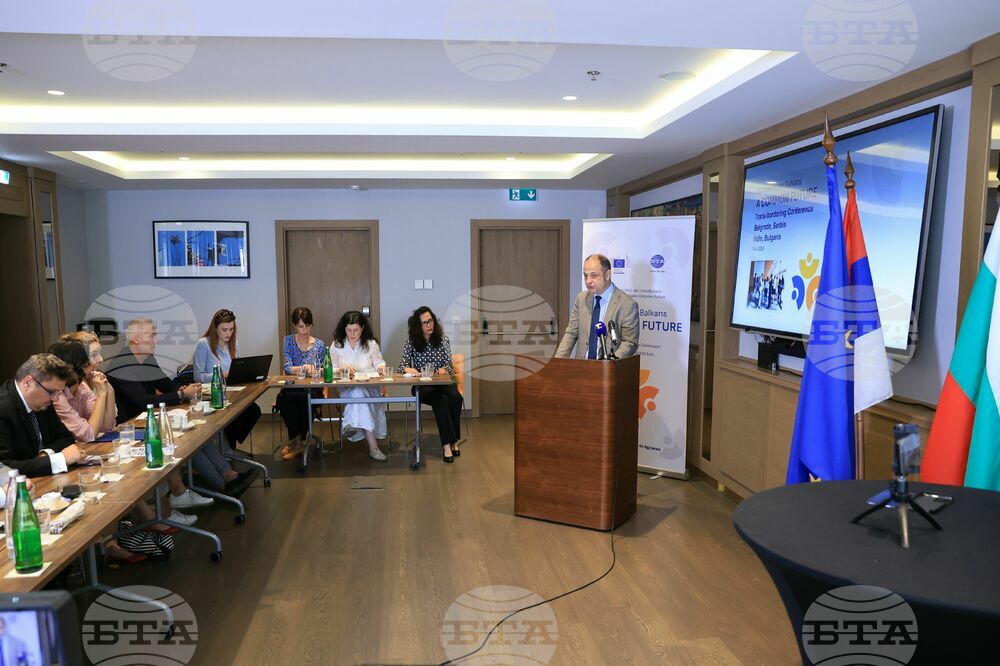site.btaCross-Border Conference Held in Belgrade, Vidin as Part of BTA's "Europe in the Balkans" Project


The sixth cross-border conference of the project "Europe in the Balkans: a Common Future", implemented by the Bulgarian News Agency (BTA), was held simultaneously in Belgrade and Vidin on Friday. On the agenda were presentations of successfully implemented cross-border projects under the Interreg-IPA Cross-border Cooperation Bulgaria-Serbia Programme in the programming periods since 2004 and the current 2021-2027 period, as well as EU Cohesion Policies in the cross-border region.
The common peaceful future of Serbia and Bulgaria depends on information connectivity, BTA Director General Kiril Valchev said at the opening of the conference in Belgrade, pointing out that BTA and Serbia's national news agency Tanjug signed an agreement on Thursday. He noted that the European Commission's choice for BTA to organize this joint project is justified, as for 126 years the "B" in the name of the agency has stood not just for "Bulgarian", but also for "Balkan", as Balkan news has been present in BTA since its very first day, February 16, 1898.
Kristina Askovic, Senior Consultant in the Department for Cross-border and Transnational Cooperation Programmes with European Union Member States at the Serbian Ministry of European Integration, said that the region covered by the Interreg-IPA Cross-Border Cooperation Bulgaria-Serbia Programme is a beautiful region that has a common history, where people can understand each other and can sit around the same table. She highlighted the goals of the cross-border programme during the different programming periods since 2004.
People need to see what the European Union is doing for them, said Ivaylo Kashkanov, Political Counsellor at the Bulgarian Embassy in Serbia. He noted that Bulgaria has always been ready to stand by Serbia on its way to the European Union. "For 20 years, Bulgaria and Serbia have been implementing joint projects under the cross-border programme with financial support from the Instrument for Pre-Accession Assistance of the EU Cohesion Policy," he pointed out.
EU cohesion policies are particularly important for less developed EU regions and therefore remain one of the EU's key priorities, said Plamena Halacheva, deputy head of the European Union Delegation to the Republic of Serbia. People often say that the Balkans are an essential part of Europe, but in her opinion, not enough is said about how to bring more Europe to the Balkans.
In 20 years of participation in EU programmes, the Regional Chamber of Commerce of Nisava Administrative District has involved directly over 500 companies from Bulgaria and Serbia, with more than 2,000 employees participating in various activities, said Zoran Markovic, Service Sector Coordinator of the Regional Chamber of Commerce and Industry of Nisava, Pirot and Toplica Administrative Districts. Markovic cited data showing that Bulgaria ranked 15th in terms of trade in the Nis region (2.3%) in 2023.
The influence of Europe in Vidin can be seen everywhere; a case in point is the improved infrastructure built over the years with European partners, Vidin Deputy Mayor Desislava Todorova said in the Danubian town. She praised BTA for the implementation of the project, as it gives local communities an opportunity to present their views on the benefits and challenges of Bulgaria's EU membership. She pointed out that in the 2014-2020 programming period, Vidin Municipality implemented projects worth over EUR 44 million under various operational programmes. One of the most significant projects for Vidin in terms of tourist infrastructure is the restoration of the Vidin Synagogue.
The main task of the Regional Information Center (RIC) in Vidin is to make the process of attracting investments to the Northwest region of Bulgaria more transparent, so as to increase awareness of opportunities provided by the EU's Cross Border Programmes, said Mariela Savkova, Manager of RIC Vidin. Savkova thanked BTA for organizing the conference, which puts the topic of EU Cohesion Policy on the agenda. She also commended the Serbian partners for their active participation in the joint cross-border projects and for the regional cooperation, which she connected with their future EU membership.
The BTA project "Europe in the Balkans: A Common Future" is supported by the European Commission. It aims to foster a better understanding of the role of cohesion policy in the Balkans; to raise awareness of projects funded by the EU through the Cohesion Funds; promote dialogue on the results of the projects at local level and boost civic participation in issues related to cohesion policy.
The project is funded with EUR 348,871. To achieve the project's aims, BTA is using a media mix and expects to reach out to between 700,000 and 1 million people in Bulgaria, Romania, Serbia, North Macedonia, Greece and Turkiye.
The series of conferences under the project was launched on December 20, 2023 in Sofia. The programme until August 2024 envisages BTA-hosted discussions in the cities of Blagoevgrad, Burgas, Varna, Vidin, Vratsa, Gabrovo, Dobrich, Kazanlak, Kardzhali, Kyustendil, Lovech, Montana, Pazardzhik, Pernik, Pleven, Plovdiv, Razgrad, Samokov, Silistra, Sliven, Smolyan, Sofia, Stara Zagora, Targovishte, Haskovo, Shumen, Yambol, Kardzhali and Haskovo, as well as cross-border conferences in Belgrade, Bosilegrad, Bucharest, Edirne, Skopje and Thessaloniki.
/DD/
Additional
news.modal.image.header
news.modal.image.text
news.modal.download.header
news.modal.download.text
news.modal.header
news.modal.text
































